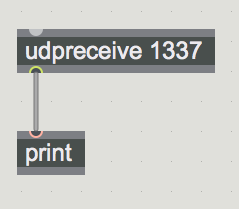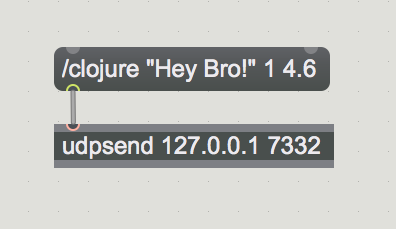Connecting Clojure to Max/MSP
Background
For a long time I’ve been working on an animation system built on the Novation Launchpad MIDI controller, and I’ve settled on Clojure as the platform. The data-oriented nature of Clojure seems ideal for representing streams of LED frames and their transformation.
Since I’d already written two interfaces for the Launchpad (for Node.js and Max), I was not eager to go through the same exercise with Clojure. Instead, I decided to run the Launchpad for Max/MSP, and have Clojure send messages to it.
Since the project is an animation system that will be sending a series of frames to the Launchpad (via Max), timing is important, while guaranteeing arrival of all information is not so much. Open Sound Control (OSC) is a real-time data format developed as a modern successor to MIDI. Since it runs on the UDP protocol and is natively supported by Max, it seemed like an easy solution. The osc-clj module (part of the Overtone project) appears to be the main contender for OSC support in Clojure.
Clojure to Max
It’s pretty easy to connect osc-clj to Max. In Max we can receive OSC messages via the udpreceive object. It takes one argument for the port on which you want it to run. I feel like this objects should be called oscreceive, but that’s neither Arthur nor Matha as my mom says.

Max will print any OSC messages it gets on port 1337. Doesn’t get much easier than that.
Let’s create an OSC client in Clojure:
(use 'overtone.osc)
(def c (osc-client "localhost" 1337))Then say ‘hello’ to Max (send a string and a series of numbers):
(osc-send c "/max" "Hey buddy." (Integer. 1) (Float. 2.7))Take a look in the Max console - you will see a message like:
received: /max Hey buddy. 1 2.7So messages are coming through. Note that for numbers, I am creating Java Integer and Float classes to tell osc-clj what OSC data type I want to send. If you use bare Clojure numbers it doesn’t currently seem to properly infer the type.
Max to Clojure
To get messages going in the other direction, we’ll use the udpreceive object’s counterpart udpsend to send data over port 7331.

On Clojure’s end, we need to first of all create a server to receive messages on the path “/clojure” and print them:
(def s (osc-server 7332))
(osc-handle s "/clojure" (fn [msg] (println msg)))Send the Max message shown above, and you will see something like:
{:src-port 53016, :src-host localhost, :path /clojure, :type-tag sif, :args (Hey Bro! 1 4.6)}So osc-clj gives us a map of various message properties (:args is the key for the message content).
If you want to use OSC routing in Max (as opposed to just using a route object), CNMAT has some objects available.
Comments